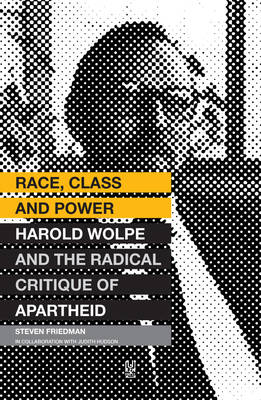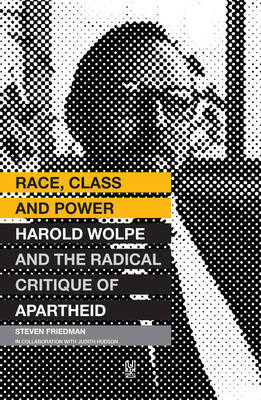
- Retrait gratuit dans votre magasin Club
- 7.000.000 titres dans notre catalogue
- Payer en toute sécurité
- Toujours un magasin près de chez vous
- Retrait gratuit dans votre magasin Club
- 7.000.0000 titres dans notre catalogue
- Payer en toute sécurité
- Toujours un magasin près de chez vous
Race, Class and Power
Harold Wolpe and the Radical Critique of Apartheid
Steven Friedman
Livre broché | Anglais
48,95 €
+ 97 points
Description
Over four decades ago, radical scholars began to suggest a new way of looking at South African society - one that blamed the economic power of those who owned property for the racial bondage of the black majority. Their work, and the debates it triggered, are mostly forgotten, but they and their critics have much to say that sheds lights on today's South African realities. Harold Wolpe was arguably the most influential theorist of this generation. His writings played a major role in a revolution in thought, and his celebrated escape from prison in the 1960s made him a symbol of alternative action. Race, Class and Power clearly and insightfully examines Wolpe's work in the political, intellectual, and social contexts in which it was developed and to which it gave form. Drawing on interviews with those who Wolpe worked with, disagreed with, and inspired, the book also maps his influence on ideas and the culture that emerged in anti-apartheid circles in the 1970s. Harold Wolpe's writings are a prism through which South African society can be viewed, and this book is an intellectual biography both of Wolpe and of South Africa's left. It also assesses and engages with the ongoing impact of Wolpe's ideas into the post-apartheid present. Moreover, it suggests how Wolpe's work can move us towards a way of thinking about and acting upon South Africa's realities differently. ** This book is a significant and provocative intervention in three discussions, namely the evolution of the analysis of South African society and its history; the role of intellectuals and social theory in the liberation struggle; and the place and content of social analysis in developing political strategy, and particularly in elaborating alternatives to the sterile policies of the ANC government. I strongly and forcefully recommend this book. -- Professor Dan O'Meara, U. of Quebec *** ...Friedman's excellent, compassionate, and fair exegesis of Wolpe's thought and its major contribution resurrects a major, often overlooked part of the South African struggle. Highly recommended. - Choice, Vol. 53, No. 1, September 2015 [Subject: History, African Studies, Apartheid Studies, Politics, Biography]
Spécifications
Parties prenantes
- Auteur(s) :
- Editeur:
Contenu
- Nombre de pages :
- 376
- Langue:
- Anglais
Caractéristiques
- EAN:
- 9781869142865
- Date de parution :
- 12-01-15
- Format:
- Livre broché
- Format numérique:
- Trade paperback (VS)
- Dimensions :
- 150 mm x 218 mm
- Poids :
- 521 g

Les avis
Nous publions uniquement les avis qui respectent les conditions requises. Consultez nos conditions pour les avis.






